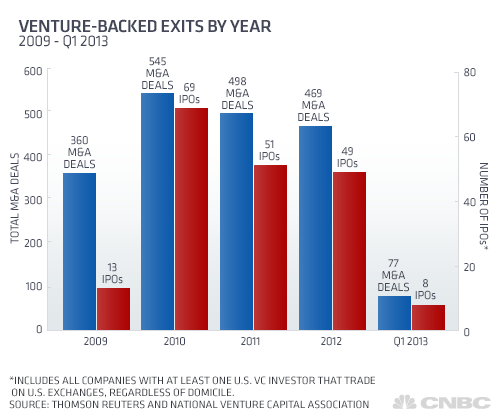It seems like the list of start-ups valued at more than $1 billion just keeps getting longer.
(Watch Video: Billion Dollar Start-up Club )
Facebook is reportedly expected to offer the social mapping company Waze $800 million to $1 billion to acquire it.The room rental start-up Airbnb has been reported to be worth $2 billion and Evernote is reported to be at $1 billion.
(Read More: Facebook in Talks to Buy Israel's Waze: Report)
The list goes on and on. But how exactly are these young companies reaching the billion buck mark? Well, they've had some help driving up their valuations from the Federal Reserve.
Fed Chairman Ben Bernanke has kept short-term interest rates near zero since 2008. While many expected rates would have gone up by now, rocky economic numbers have many speculating that rates aren't changing anytime soon. For young entrepreneurs, low interest rates can translate into easy funding.
(Read More: Fed Keeps Interest Rates Low, Continues Bond-Buying Program)
Basically, securing large investments from private-equity firms is a lot easier when interest rates are low because the opportunity costs are low. Basic macroeconomic theory suggests that bonds are an alternative to equity investments, which include venture capital investments. When bond returns fall, the relative attractiveness of investing in venture capital funds increases.
Once you've locked in one private investor, well, it doesn't take very long for bidding to start to take-off.
In addition, because a growing number of high valued start-ups—such as SurveyMonkey, which is also valued at more than $1 billion— are focused on the enterprise market and not just consumers, taking a stake in a young company is lot more reasonable to investors because the business model is seen as less risky.
And yet, while it doesn't currently look like tech has reached the full-blown bubble stage, there is some disturbing behavior when it comes to later-stage investments in private companies that is becoming "frothy," said Bill Gurley of Benchmark Capital last month at the Disrupt TechCrunch conference
(Read More: Signs of Another Tech Bubble: VC)
"The late-stage private market continues to be the most frothy thing I've seen since the late nineties. And I thought it was going to go away when you had these iconic IPOs that ended up trading at a fraction of the private rounds, but it hasn't," Gurley said.
"If you have a hot company that is in the select chosen one, you've got people knocking on your door, begging you take money ... historically, overtime, it's been shown to become a bad thing," he said.
According to a recent MoneyTree report by PricewaterhouseCoopers and the National Venture Capital Association based on data from Thomson Reuters data, late-stage investments have been steadily increasing.
However, once the Fed takes away the massive liquidity it is putting into the system and interest rates head higher, it could have a negative impact on the venture community, Gurley said. That doesn't bode well for the start-ups looking for funding.
The easy money isn't as easy as it once was, said Sanjeet Paul Choudary, a venture advisor who analyzes start-up strategies.
During the three years leading up to the Facebook IPO—from 2009 to 2012—investors were putting large sums of money into early stage start-ups because more conventional forms of investments, like housing, weren't profitable, he said.





